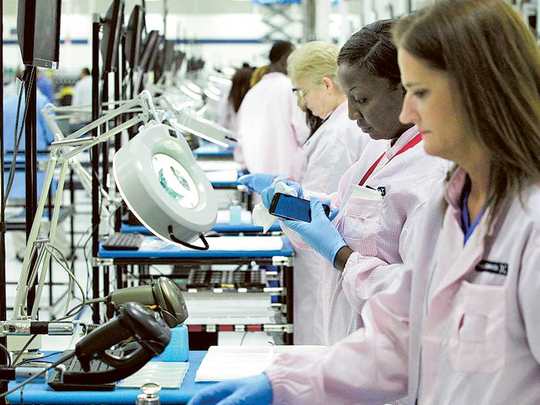
Brussels: US President Donald Trump’s policy plans in his first days in office are likely to dominate headlines in the coming week, but the new president himself will also get a first readout on the health of the US economy.
And for all his call to make American great again, data should confirm that the economy is clipping along at a healthy rate even before Trump’s promised tax cuts and infrastructure spending.
While Trump has talked of a feverish first full day — with orders and notifications to withdraw from the TPP trans-Pacific trade pact, cancellation of restrictions of energy production and curbs on illegal immigrants — the economic diary is light.
Further details of a stimulus package, which could be watered down by Congress, could be the dominant economic event.
Other than that, a week before the monetary policy meetings of the Federal Reserve, the Bank of England and the Bank of Japan and a week after a European Central Bank sitting, the standout figures are likely to be first estimates for US growth on Friday and for British growth a day earlier.
The US economy is seen expanding by an annualised rate of 2.2 per cent in the final quarter of 2016, easing from the 3.5 per cent of third quarter as net trade turns negative, but with solid consumption growth and a reduced drag from the energy price collapse that hit investment.
“We’re seeing a lot of momentum in some areas of the economy,” said Laura Rosner, economist at BNP Paribas. “It’s a bit of a step down, but is still very healthy and really should support expectations for further growth and expansion.”
“It’s an important number but at the same time markets are focused on the outlook, particularly given all the potential policy changes,” she added.
Rosner, like other economists, sees US growth accelerating this year and next, buoyed by the fiscal stimulus.
Harm Bandholz, chief US economist at UniCredit, sees the effect of that being at the end of 2017, but says there is then a risk increased consumption hikes imports, leading to a call for growth-draining trade protection.
According to a Reuters poll in the past week, the top risk to US growth is that Trump keeps his protectionist promises.
In Britain, it is the week after Prime Minister Theresa May’s big speech on Britain’s plans to leave the European Union. The chief Brexit news is likely to be Tuesday’s supreme court ruling on parliamentary involvement in triggering the EU’s Article 50 exit clause.
Britain too will report a first estimate for economic growth in the fourth quarter. Like the United States, GDP is seen easing, to 0.5 per cent quarter-on-quarter from 0.6 per cent in the July-Sept period.
James Knightley, ING senior economist, said the report is likely to confirm that the UK economy grew faster than that of the United States, the Eurozone and Japan in 2016. However, the outlook for 2017 is less rosy.
“Inflation is going to rise, driven by import costs for energy and food, particularly as hedged positions end. This should weaken consumer spending, while the triggering of Article 50 could lead to business being more cautious,” Knightley said.
For the Eurozone, purchasing manager indexes should confirm continued steady growth across industry and services in January.
In Europe’s largest economy, business sentiment is forecast to push slightly beyond December’s near three-year high in Ifo’s report on Wednesday, with both the assessment of current conditions and expectations ticking higher.
The mood among German analysts and investors improved slightly in January, figures showed on Tuesday, with rising expectations “a leap of faith for 2017” after a stronger-than-expected economic performance by Germany last year.
Elsewhere, Turkey is one of few countries where central bank policymakers will meet faced, like many emerging markets, with a challenge from the strong dollar. Its central bank will undergo a credibility test, with investors hoping for a significant interest rate hike after attempts to defend the Turkish lira with liquidity measures proved ineffective.












